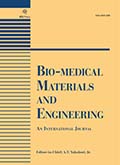Authors: Tian, Yongzheng | Sun, Ruilong | Li, Yunfei | Liu, Peng | Fan, Bo | Xue, Yun
Article Type:
Review Article
Abstract:
BACKGROUND: Bone defects arising from diverse causes, such as traffic accidents, contemporary weapon usage, and bone-related disorders, present significant challenges in clinical treatment. Prolonged treatment cycles for bone defects can result in complications, impacting patients’ overall quality of life. Efficient and timely repair of bone defects is thus a critical concern in clinical practice. OBJECTIVE: This study aims to assess the scientific progress and achievements of magnesium phosphate bone cement (MPC) as an artificial bone substitute material. Additionally, the research seeks to explore the future development path and clinical potential of MPC bone cement in addressing challenges associated
…with bone defects. METHODS: The study comprehensively reviews MPC’s performance, encompassing e.g. mechanical properties, biocompatibility, porosity, adhesion and injectability. Various modifiers are also considered to broaden MPC’s applications in bone tissue engineering, emphasizing drug-loading performance and antibacterial capabilities, which meet clinical diversification requirements. RESULTS: In comparison to alternatives such as autogenous bone transplantation, allograft, polymethyl methacrylate (PMMA), and calcium phosphate cement (CPC), MPC emerges as a promising solution for bone defects. It addresses limitations associated with these alternatives, such as immunological rejection and long-term harm to patients. MPC can control heat release during the curing process, exhibits superior mechanical strength, and has the capacity to stimulate new bone growth. CONCLUSION: MPC stands out as an artificial bone substitute with appropriate mechanical strength, rapid degradation, non-toxicity, and good biocompatibility, facilitating bone repair and regeneration. Modification agents can enhance its clinical versatility. Future research should delve into its mechanical properties and formulations, expanding clinical applications to create higher-performing and more medically valuable alternatives in bone defect repair.
Show more
Keywords: Biomaterials, bone regeneration, magnesium phosphate cement, bone cement, strength of materials
DOI: 10.3233/BME-230164
Citation: Bio-Medical Materials and Engineering,
vol. 35, no. 3, pp. 265-278, 2024
Price: EUR 27.50





